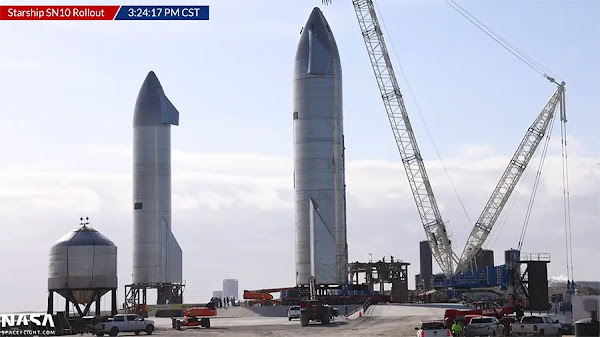The launch of the Starship SN9 rocket was postponed, Elon Musk was very disappointed.
Plans for launching the SN9 series SpaceX Starship prototype rockets today have officially been postponed, launching from NasaSpaceFlight. This delay due to SN9 has not been granted permission by the FAA (Federal Aviation Administration) authorities.
Previously, the flight that had been eagerly awaited since early January 2021 yesterday was delayed several times due to Helium tank testing and several Raptor engine changes. Hence, SpaceX had to carry out a series of static combustion tests (Static Fire Test). However, this time the relaunch was delayed because the FAA had not permitted to fly.
Plans for launching the SN9 series SpaceX Starship prototype rockets today have officially been postponed, launching from NasaSpaceFlight. This delay due to SN9 has not been granted permission by the FAA (Federal Aviation Administration) authorities.
Previously, the flight that had been eagerly awaited since early January 2021 yesterday was delayed several times due to Helium tank testing and several Raptor engine changes. Hence, SpaceX had to carry out a series of static combustion tests (Static Fire Test). However, this time the relaunch was delayed because the FAA had not permitted to fly.
The FAA has not been permitted to fly, the launch of the Starship SN9 Rocket has been postponed.
The flight test of the SpaceX Starship SN9 space rocket on January 28 was postponed as the company awaited approval from the FAA, but this delay turned out to be a huge disappointment for Elon Musk.
SpaceX has planned to conduct a suborbital flight of its Starship SN9 rocket at the Boca Chica test site, Texas, on January 28 local time. The rocket will make a similar flight to that of the SN8 vehicle on December 9, this time to an altitude of 10 kilometers before landing back in Boca Chica.
However, the temporary flight restriction (TFR) that closed the airspace around the test site was suddenly lifted around midday, even as SpaceX was preparing its Starship SN9 rocket for the flight.
A source familiar with the FAA and SpaceX discussions said that the agency requested additional information about the Starship SN9 rocket and launch plans before giving final approval.
SpaceX CEO, Elon Musk, chided the FAA for the delay.
"Unlike its aircraft division, which is fine, the FAA's space division has a regulatory structure that is fundamentally broken. Under that rule, humanity will never get to Mars." tweeted.
This has many people wondering whether SpaceX can launch without a TFR or other FAA approval. Nevertheless, the countdown was stopped before the SN9 rocket ignited. SpaceX is subject to regulations.
A second attempt at launch on January 29 failed because an FAA Advisor declared the launch had been canceled in the morning. However, by midday, SpaceX said SN9 should have rolled out by February 1.
Neither SpaceX nor the FAA gave what the problem behind the delay in flight permits was. "We will continue to work with SpaceX to resolve outstanding safety issues before we approve the next flight test," FAA spokesman Steven Kuhn told SpaceNews on January 29.
An official statement from the FAA regarding the delay in launching SN9
"The FAA will continue to work with SpaceX to evaluate additional information regarding modifications to the launch license," the FAA said in a statement at the end of January 29.
"While we recognize the importance of moving quickly to drive growth and innovation in the commercial space, the FAA will not sacrifice its responsibility to protect public safety."
"We will approve the modifications only after we are sure that SpaceX has taken the steps necessary to comply with regulatory requirements." -FAA.
However, it was alleged that the conflict between the FAA and SpaceX was different because the FAA gave different treatment to other aviation industries. According to Musk, SpaceX is like a stepchild.
This contrasts with the streamlining of the launch regulations that the FAA submitted last fall. The new regulations came into effect 90 days after their official publication on the Federal Register on December 10.
The FAA responded to Musk's disappointment.
The FAA Association administrator for commercial space transport, Wayne Monteith, said he understands the industry's desire to move fast.
“Once the rockets are ready to launch, and the payload is ready, they are allowed. We do not want to be a hindrance to the success of US companies. We as the main regulators in this industry are ready. " -Wayne Monteith.
Monteith said he is willing to speak directly to Musk if there are regulatory issues.
“CEOs and company presidents also have my direct line. They can contact me directly if our team is miscommunicating or not communicating well with each other, "said Monteith.
"Problems that may take weeks or months for staff to resolve can sometimes be resolved in one phone call. While no one likes to be organized, it matters. First, it keeps everyone safe, and number two provides an environment. stable for investors. " Monteith said.
Source: google, youtube











COMMENTS